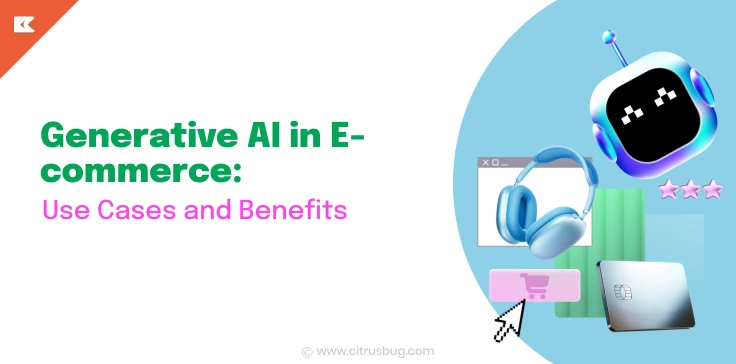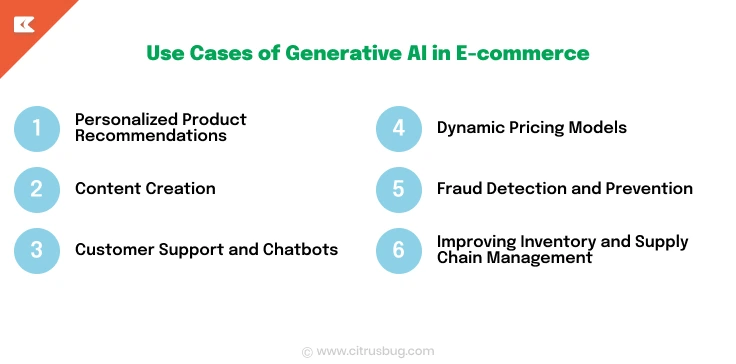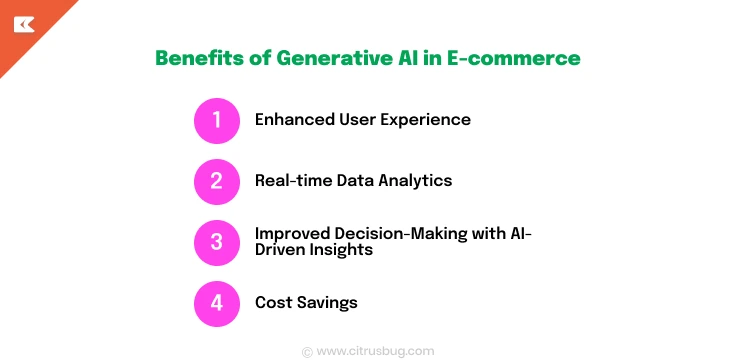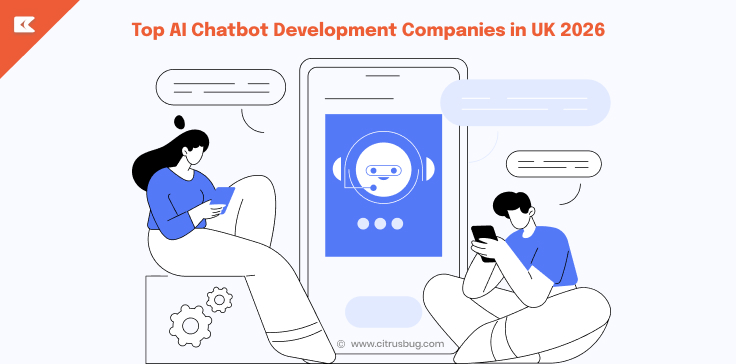Generative AI in E-commerce: Use Cases and Benefits
- December 27, 2024
-
5404 Views
- by Ishan Vyas

Generative AI revolutionizes e-commerce businesses, providing imaginative solutions to longstanding challenges. It automated content creation, including product descriptions, high-resolution images, and virtual try-on experiences. These innovations save time, streamline efforts, and ensure consistent branding across platforms, offering customers tailored recommendations and richer shopping experiences, which boost satisfaction and loyalty.
Beyond content creation, generative AI supports smarter decision-making by identifying trends, predicting customer preferences, and optimizing inventory. For instance, it forecasts demand for seasonal products, helping businesses prepare and reduce excess stock. The global generative AI market, set to reach USD 208.8 billion by 2032 with a 35.3% CAGR, highlights its transformative potential. Key segments like transformers (42% share) and media & entertainment (20% share) showcase its diverse applications, driven by growing adoption across industries.
1. What is Generative AI in the Context of E-commerce?
In the realm of e-commerce, sophisticated AI models play a vital role in generating new content, streamlining processes, and enriching user experiences. These technologies, especially advanced tools like AI humanizer, can craft product descriptions, visuals, and marketing copy, minimizing the manual labor required from businesses. By automating functions such as content creation and personalization, companies can enhance their efficiency and improve customer outcomes.
AI systems also analyze shopping behaviour to offer tailored product suggestions that align with individual preferences. For example, online stores can use AI to design engaging visuals or simulate how products look when worn or used. The technology also helps predict trends and optimize stock levels, ensuring businesses stay ahead of customer demand.
With these capabilities, e-commerce companies improve the shopping experience and decision-making processes. Customers get more personalized experiences, while businesses save time and money. AI helps brands predict customers’ needs, track inventory, and increase sales. As more stores use these tools, online shopping gets faster, smarter, and more suited to each person’s preferences. This shift is changing e-commerce, where creativity and innovation lead the way forward.
2. Use Cases of Generative AI in E-commerce
Generative AI transforms e-commerce by automating product descriptions, creating visuals, and delivering personalized recommendations based on user behaviour. It also powers virtual try-ons, chatbots, and demand forecasting to optimize inventory. These applications streamline operations, enhance customer experiences, and drive sales growth. Read these use cases below to understand how advanced AI tools are transforming the e-commerce industry.
-
Personalized Product Recommendations
In the vast digital marketplace, finding the perfect item can feel overwhelming. Traditional e-commerce platforms relied on basic algorithms, offering generic product recommendations. Using rule-based techniques, these systems often miss the mark, leading to low engagement and lost sales.
Generative AI has transformed this landscape by creating highly personalized shopping experiences. Modern AI-powered engines use deep learning and NLP to analyze browsing patterns, purchase history, and real-time interactions. For instance, Amazon’s AI-driven recommendations now contribute 35% of its revenue by accurately predicting preferences.
Platforms like Shopify and Alibaba leverage transformer models to generate tailored product suggestions. These systems consider factors like customer profession and usage patterns, improving both relevance and engagement. Neural networks and attention mechanisms power these engines, optimizing results based on customer feedback.
Tech leaders like Google and Pinterest continue to innovate, using AI advancements to set new standards in personalized e-commerce. This revolution drives higher conversions, improved customer satisfaction, and increased business revenue.
-
Content Creation
The role of AI in e-commerce is how businesses approach content creation. Writing product descriptions or planning campaigns previously required considerable time and effort. Now, however, AI technology allows businesses to produce personalized SEO-friendly material tailored precisely to their brand style that also keeps up with trends.
Walmart and Target use artificial intelligence (AI) to efficiently create product descriptions and social media updates quickly and reliably. In contrast, fashion and beauty brands use AI for trend-focused content creation and personalized suggestions, helping strengthen relationships with their customer base and build stronger bonds between themselves and customers.
AI also simplifies adapting content for different audiences while remaining true to the brand’s identity. Instead of replacing creative teams, AI supports them by taking care of repetitive tasks so they can focus their energy and creativity on more strategic ideas and plans.
Businesses report up to 70% faster content creation and a 40% boost in engagement. Product launches and seasonal campaigns, once labor-intensive, now happen swiftly while retaining the human touch customers value.
-
Customer Support and Chatbots
AI transforms customer support in e-commerce by simplifying interactions and delivering quick, personalized assistance. Chatbots now handle routine queries, such as order tracking or product details, with human-like accuracy. Unlike traditional bots, they understand context and intent, making conversations natural and engaging.
They personalize interactions by analyzing customer behavior and offering tailored product recommendations during chats. Generative AI ensures seamless support across platforms, from websites to social media. This technology improves efficiency and customer satisfaction by providing quick, relevant assistance anytime.
-
Dynamic Pricing Models
Dynamic pricing in e-commerce has become more intelligent and responsive thanks to AI. Businesses now monitor market trends, competitor strategies, and customer behaviour patterns using AI for competitive intelligence, and adjust prices instantly in response to changing demand, inventory, or seasonal shifts utilizing this powerful technology. Gen AI in retail helps optimize pricing by adapting instantly to shifts caused by changes in demand, inventory fluctuations, or seasonal trends.
AI tailors pricing based on customer segmentation and preferences. During high-demand periods, prices may rise, whereas discounts are offered in slower sales seasons to enhance profits and sales. By categorizing customers according to their preferences, AI maintains competitive pricing and increases profitability through data-driven adjustments, ultimately improving the shopping experience with equitable, informed modifications. To further streamline the pricing process, businesses can also use AI-powered SAP CPQ, which helps ensure accurate pricing and seamless quote generation.
-
Fraud Detection and Prevention
E-commerce thrives on trust, but fraud poses a significant threat to it. Generative AI offers powerful tools to address this challenge. By analyzing massive datasets, it can detect subtle patterns that might escape human attention, acting like a super-powered fraud detective. For example, this AI can identify suspicious transactions in real-time, such as a sudden surge in orders from a new account or an unusually large purchase made with a new credit card.
It goes beyond simple pattern recognition. It can create synthetic data to train fraud detection models. This helps improve accuracy and adapt to new fraud tactics. Imagine teaching the AI on millions of fake, fraudulent transactions. This allows it to learn and identify even the most sophisticated schemes. Moreover, generative AI in e-commerce can personalize security measures. It can adjust security protocols based on individual customer behavior. High-risk transactions might require extra verification steps. Low-risk transactions proceed smoothly. This provides a seamless experience while enhancing security.
The benefits are clear: reduced losses from fraud, improved customer trust, and more efficient operations. However, it’s crucial to remember that AI is a tool. Human oversight remains essential, and it’s vital to monitor and refine AI’s performance continuously. Generative AI is a significant weapon in the ongoing battle against e-commerce fraud. It’s constantly evolving to stay ahead of the curve, and it plays an increasingly important role in ensuring a safe and reliable online shopping experience.
-
Improving Inventory and Supply Chain Management
Generative AI is crucial in managing inventory and supply chain operations in e-commerce. Analyzing past sales and customer trends helps businesses predict product demand more accurately. This ensures popular items are always in stock while avoiding overstocking less popular ones. AI also improves supply chain efficiency by spotting potential delays or stock shortages. For example, it can suggest faster shipping routes or alternative suppliers. By understanding generative AI, businesses can prepare better for busy times like holidays. These improvements save costs and keep customers happy by ensuring smooth operations and timely deliveries.
3. Benefits of Generative AI in E-commerce
AI can play an invaluable role in e-commerce by improving customer experience, streamlining operations, and driving sales. Here’s how it could impact this sector:
-
Enhanced User Experience
LLMs greatly enhance user experiences on e-commerce platforms by improving search and discovery processes, translating natural language queries, and providing accurate results. This makes it easier to find customers’ needs and improves satisfaction and engagement with online shopping experiences. They also help the sales team and customer support respond more quickly and personally by offering useful insights and suggested replies in real time. Besides that, the sales team can also benefit from lead-to-account matching, ensuring that potential buyers are aligned with the right accounts for more targeted outreach and better conversion opportunities.
-
Real-time Data Analytics
It provides one of the key advantages to e-commerce businesses – efficiently processing large datasets to analyze customer behaviour, market trends, and product performance in order to reveal actionable insights that allow businesses to make smarter decisions like improving inventory management or refining marketing strategies.
It can assist companies with pricing adjustments based on current market conditions and demand patterns, enabling them to respond rapidly to changes, increase customer satisfaction, and stay ahead of the competition in an ever-evolving competitive landscape. Web scraping techniques with BeautifulSoup can also help gather real-time competitor data, giving businesses a strategic edge in market analysis
-
Improved Decision-Making with AI-Driven Insights.
AI-driven insights significantly enhance decision-making in e-commerce businesses. By analyzing vast amounts of data, these insights uncover patterns in customer behavior, market trends, product performance, and inventory prediction, often powered by advanced demand planning software, allowing enterprises to predict demand more effectively while managing inventory efficiently.
AI also assists businesses by helping them identify successful marketing strategies or areas that require attention and suggesting optimal times or dates for promotions or launches. This provides more intelligent decision-making that leads to superior customer experiences, increased sales figures, and smooth operations overall.
With these insights, businesses can make smarter decisions, which can lead to improved customer experiences, increased sales figures, and streamlined operations. This results in intelligent decision-making that enhances customer experiences and increases sales results from increased inventory management practices and streamlined operations.
-
Cost Savings
Cost savings can be an attractive feature of AI for e-commerce businesses. Automation technology automates tasks such as inventory management to reduce waste and avoid overstocking while increasing pricing efficiency. This keeps products competitive while protecting profits and reducing labor costs, which is made possible through chatbot development services, which enable AI-powered customer support and ensure 24/7 service availability.
In addition, AI improves supply chains by anticipating disruptions before delays arise. This offers businesses innovative cost-saving solutions that streamline operations while cutting expenses and increasing profits.
4. Future of Generative AI in E-commerce
Generative AI will transform online retailing by creating highly tailored customer shopping experiences. By analyzing customer data, this AI technology can tailor product recommendations that align closely with individual preferences. Furthermore, its use will enhance customer service via AI-powered chatbots that offer 24-hour support while learning from customer interactions to refine responses more accurately than before. Features like visual search and virtual tryouts will also allow shoppers to locate items quickly using images before purchasing.
It will streamline operations through predictive analytics and dynamic pricing strategies, helping retailers forecast product demand more accurately for inventory management purposes and reduce stockouts; content generation tools automate product descriptions and marketing materials creation, thereby saving both time and resources; ultimately, this AI technology will not only boost customer engagement but provide small businesses with competitive advantages to make e-commerce landscape more dynamic and efficient.
Wrapping Up
In conclusion, generative AI in e-commerce is revolutionizing the industry with its wide use cases and benefits. It improves customer experiences through personalized recommendations and brilliant product discovery. AI also streamlines inventory management, ensuring businesses never run out of popular items. Fraud detection is enhanced, helping to protect companies and customers from potential threats. Moreover, AI helps optimize pricing and supply chain management, saving costs. For e-commerce businesses looking to harness these benefits, Citrubug, an e-commerce software development company, can help integrate AI solutions smoothly and effectively.





 SaaS Development
SaaS Development Web Application Development
Web Application Development Mobile Application Development
Mobile Application Development Custom Software Development
Custom Software Development Cloud Development
Cloud Development DevOps Development
DevOps Development MVP Development
MVP Development Digital Product Development
Digital Product Development Hire Chatbot Developers
Hire Chatbot Developers Hire Python Developers
Hire Python Developers Hire Django Developers
Hire Django Developers Hire ReactJS Developers
Hire ReactJS Developers Hire AngularJS Developers
Hire AngularJS Developers Hire VueJS Developers
Hire VueJS Developers Hire Full Stack Developers
Hire Full Stack Developers Hire Back End Developers
Hire Back End Developers Hire Front End Developers
Hire Front End Developers AI Healthcare Software Development & Consulting
AI Healthcare Software Development & Consulting Healthcare App Development
Healthcare App Development EHR Software Development
EHR Software Development Healthcare AI Chatbot Development
Healthcare AI Chatbot Development Telemedicine App Development Company
Telemedicine App Development Company Medical Billing Software Development
Medical Billing Software Development Fitness App Development
Fitness App Development RPM Software Development
RPM Software Development Medicine Delivery App Development
Medicine Delivery App Development Medical Device Software Development
Medical Device Software Development Patient Engagement Software Solutions
Patient Engagement Software Solutions Mental Health App Development
Mental Health App Development Healthcare IT Consulting
Healthcare IT Consulting Healthcare CRM Software Development
Healthcare CRM Software Development Healthcare IT Managed Services
Healthcare IT Managed Services Healthcare Software Testing services
Healthcare Software Testing services Medical Practice Management Software
Medical Practice Management Software Outsourcing Healthcare IT Services
Outsourcing Healthcare IT Services IoT Solutions for Healthcare
IoT Solutions for Healthcare Medical Image Analysis Software Development Services
Medical Image Analysis Software Development Services Lending Software Development Services
Lending Software Development Services Payment Gateway Software Development
Payment Gateway Software Development Accounting Software Development
Accounting Software Development AI-Driven Banking App Development
AI-Driven Banking App Development Insurance Software Development
Insurance Software Development Finance Software Development
Finance Software Development Loan Management Software Development
Loan Management Software Development Decentralized Finance Development Services
Decentralized Finance Development Services eWallet App Development
eWallet App Development Payment App Development
Payment App Development Money Transfer App Development
Money Transfer App Development Mortgage Software Development
Mortgage Software Development Insurance Fraud Detection Software Development
Insurance Fraud Detection Software Development Wealth Management Software Development
Wealth Management Software Development Cryptocurrency Exchange Platform Development
Cryptocurrency Exchange Platform Development Neobank App Development
Neobank App Development Stock Trading App Development
Stock Trading App Development AML software Development
AML software Development Web3 Wallet Development
Web3 Wallet Development Robo-Advisor App Development
Robo-Advisor App Development Supply Chain Management Software Development
Supply Chain Management Software Development Fleet Management Software Development
Fleet Management Software Development Warehouse Management Software Development
Warehouse Management Software Development LMS Development
LMS Development Education App Development
Education App Development Inventory Management Software Development
Inventory Management Software Development Property Management Software Development
Property Management Software Development Real Estate CRM Software Development
Real Estate CRM Software Development Real Estate Document Management Software
Real Estate Document Management Software Construction App Development
Construction App Development Construction ERP Software Development
Construction ERP Software Development







